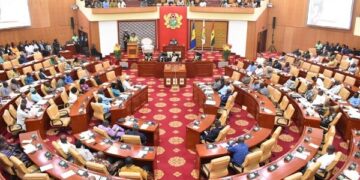Chief Justice Kwasi Anin Yeboah says the Judiciary has no power to interfere with media freedom.
He said because, without the media, the work of securing and sustaining democracy would be one hundred times more arduous and that the media’s work was critical for the survival of any democracy, adding, the two must work together.
” The country’s democracy requires the press and the Judiciary to work together and we must focus on efforts to build trust between us, so we can build confidence in our institutions from the public,” the Chief Justice said.
He said Ghana must and would remain a bastion of freedom of speech, however “we must urgently address the issues of standards and propriety in relation to court reporting, else we leave ourselves vulnerable to misinformation that will mislead the citizenry.”
Chief Justice Anin Yeboah was speaking at the inauguration of the Judicial Press Corps and the launch of a Handbook for Journalists on reporting on the Judiciary.
The Handbook will serve as a guide for journalists who report on the Judiciary and the justice delivery system.
The 37-page book highlights terminologies in court reporting, common Latin words, nature of contempt cases and other related offences.
He said the work of the Judiciary within the Constitutional architecture required that information about it (Judiciary) was accurate and handled with utmost care not to deceive the public.
The Chief Justice said when information, which was not true about pending cases was spread, it undermined trust and “eats away the very foundations of the Republic.”
He charged members of the Press Corps to be highly professional and circumspect with sensitive cases, saying for example, “Matters relating to pending matrimonial issues should not be a subject of publication.”
Justice Dennis Dominic Adjei, a Justice of the Court of Appeal, said the role of journalists in justice delivery was crucial, particularly where justice was delivered to all manner of persons “according to law without barrier.”
He said every profession had its language and that journalists who communicated to the public about the events of the court must be abreast of the language of the court and communicate in the language understood by the people without changing the meaning.
Mr Alfred Monney, President of the Ghana Journalists Association, commended the Judicial Service for training court reporters.
He urged the Press Corps to make good use of the handbook.
GNA
Closure of Ghana’s Embassy in Washington DC reckless and tactless decision – Patrick Boamah
Patrick Yaw Boamah calls for tact and transparency as Parliament seeks answers on Washington mission shutdown and alleged ECG cartel
Read moreDetails


















































































